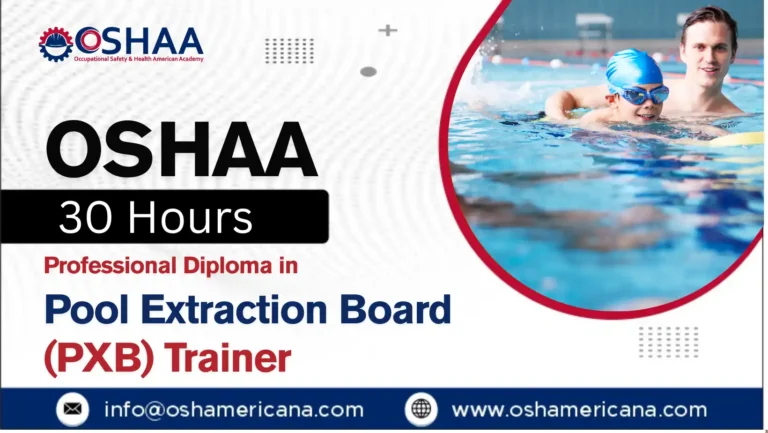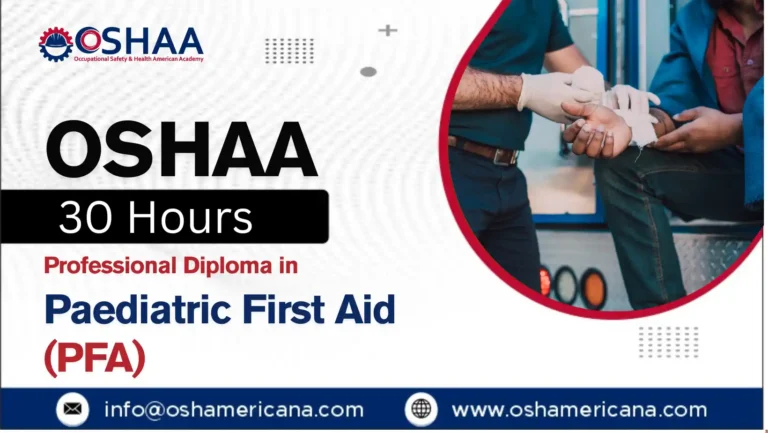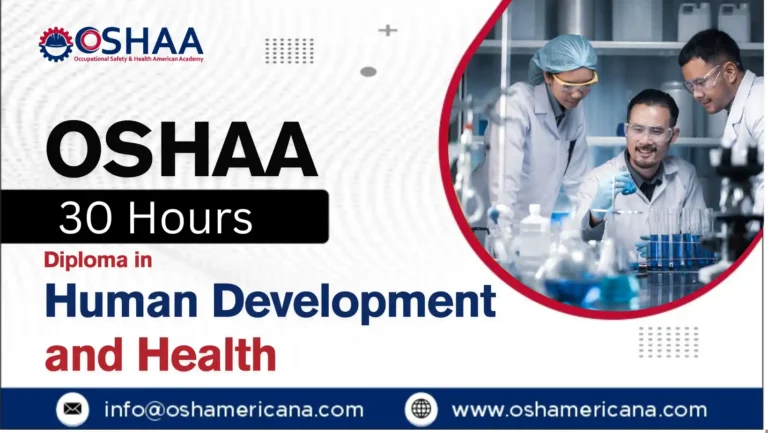Advance your expertise with the OSHAA 30-Hours Professional Diploma in Child Development and Disabilities, designed to equip professionals with essential knowledge and strategies to support children’s growth, learning, and inclusion.
The OSHAA 30-Hours Professional Diploma in Child Development and Disabilities is a comprehensive qualification designed to deepen the understanding of how children grow, learn, and adapt across physical, cognitive, emotional, and social domains. In today’s evolving educational and healthcare landscape, possessing specialized knowledge in child development is essential for professionals who support children of all abilities. The OSHAA 30-Hours Professional Diploma in Child Development and Disabilities diploma provides learners with the tools to understand both typical and atypical development, preparing them to identify developmental challenges early and implement effective intervention strategies that promote inclusion, resilience, and positive outcomes for every child.
Through the OSHAA 30-Hours Professional Diploma in Child Development and Disabilities, participants explore the foundational principles of child growth, from infancy through adolescence, with a focus on the unique needs of children with developmental disabilities. The OSHAA 30-Hours Professional Diploma in Child Development and Disabilities program emphasizes the importance of early identification, evidence-based assessment, and personalized support to address developmental delays and disorders. Learners gain insights into various types of disabilities—including cognitive, physical, sensory, and emotional—and how these factors influence a child’s learning and social participation. By mastering inclusive education and developmental psychology, participants will be equipped to design environments that nurture potential and promote equal opportunities for all children.
Professionals in education, healthcare, and social services will find the OSHAA 30-Hours Professional Diploma in Child Development and Disabilities particularly relevant to their daily practice. The course bridges theoretical understanding with real-world application, enabling participants to develop intervention plans that cater to the holistic needs of children and their families. It covers key areas such as developmental milestones, special educational needs, behavioral support, family engagement, and multidisciplinary collaboration. Each module is structured to build confidence and competence, empowering professionals to respond effectively to the diverse needs of children across different developmental stages.
The OSHAA 30-Hours Professional Diploma in Child Development and Disabilities also emphasizes compliance with international care and educational standards, aligning with best practices in early childhood education, special education, and healthcare. Participants learn how to apply ethical, culturally sensitive, and inclusive approaches that respect every child’s right to participation and development. The course highlights the importance of cross-sector collaboration between educators, healthcare providers, and families to ensure comprehensive care and sustainable development for children with disabilities.
By completing the OSHAA 30-Hours Professional Diploma in Child Development and Disabilities, learners not only expand their professional knowledge but also enhance their ability to create meaningful change in their workplaces and communities. This qualification fosters critical thinking, empathy, and professional competence, empowering participants to make informed decisions that positively influence children’s developmental outcomes. Whether you are a teacher designing inclusive learning experiences, a healthcare practitioner supporting developmental therapies, or a social worker advocating for children’s rights, this diploma equips you with the expertise to make a lasting impact.
The OSHAA 30-Hours Professional Diploma in Child Development and Disabilities stands as a globally recognized credential for professionals dedicated to advancing child welfare and inclusive education. It opens pathways to professional growth, strengthens understanding of developmental diversity, and reinforces the vital role of early intervention in improving children’s futures. By integrating theoretical frameworks with applied learning, the course ensures that every participant emerges as a skilled, compassionate, and knowledgeable professional capable of promoting holistic child development and supporting children with disabilities toward a more inclusive and equitable future.
OSHAA 30-Hours Professional Diploma in Child Development and Disabilities
To enroll in the OSHAA 30-Hours Professional Diploma in Child Development and Disabilities, learners are expected to meet the following criteria:
1. Age Requirement
• Applicants must be at least 18 years of age at the time of enrollment.
• This ensures that participants possess the maturity and responsibility necessary for understanding sensitive topics related to child development and disabilities.
• The course is designed for adult learners who are capable of applying theoretical knowledge to real-world educational, social, or healthcare settings.
• Individuals under 18 may be considered in exceptional cases, provided they demonstrate strong academic ability and professional interest in child development.
2. Educational Background
• A minimum of secondary or high school education is required for admission to the OSHAA 30-Hours Professional Diploma in Child Development and Disabilities.
• Applicants with higher education in psychology, education, healthcare, social sciences, or related fields will find this qualification particularly beneficial.
• A background in early childhood education, special needs support, or community welfare can enhance comprehension and practical application of course materials.
• The course welcomes learners from diverse educational backgrounds who are passionate about child welfare, developmental psychology, and disability support.
3. Work Experience
• Prior professional experience is not mandatory to enroll in the OSHAA 30-Hours Professional Diploma in Child Development and Disabilities.
• However, individuals already working as teachers, social workers, caregivers, healthcare assistants, or early childhood practitioners will gain significant career advancement opportunities through this program.
• Those with limited experience will still benefit from practical examples, case studies, and scenario-based learning integrated throughout the diploma.
• The course structure supports both beginners seeking to enter the child development sector and professionals aiming to specialize in supporting children with disabilities.
4. English Proficiency
• Participants must possess a good command of the English language to successfully complete the OSHAA 30-Hours Professional Diploma in Child Development and Disabilities.
• Learners should be able to read, write, and communicate effectively in English to understand course content, participate in discussions, and interpret case studies.
• As the course materials, assessments, and certification standards are presented in English, proficiency ensures that participants can fully engage with the academic and professional requirements.
• Non-native English speakers are encouraged to have at least an intermediate level of English proficiency to maximize learning outcomes.
Meeting these eligibility requirements ensures that participants are prepared to fully benefit from the OSHAA 30-Hours Professional Diploma in Child Development and Disabilities. This qualification is designed to build the knowledge, confidence, and skills needed to support children’s growth and inclusion, while enhancing professional expertise in the fields of education, healthcare, and social services. The course promotes global best practices in child development and disability support, making it an ideal choice for individuals committed to improving the quality of life and learning experiences for children worldwide.
Study Units
Learning Outcomes
Introduction to Child Development and Disabilities (3 Hours)
- Understand the basic concepts of child development and disabilities.
- Gain insight into the significance of early childhood development and the impact of disabilities on growth.
- Familiarise with the key principles and theories of child development.
- Recognise the importance of early diagnosis and intervention in children with disabilities.
Key Stages of Child Development: Milestones and Factors (4 Hours)
- Identify the key stages and milestones of child development from infancy to adolescence.
- Understand the factors that influence development, including genetics, environment, and culture.
- Learn how to assess developmental progress and detect early signs of delays.
- Examine the role of caregivers and educators in supporting developmental milestones.
Types of Disabilities in Children: Understanding the Spectrum (4 Hours)
- Understand the different types of disabilities that children may experience, including physical, intellectual, and sensory disabilities.
- Learn about common developmental disorders, such as autism spectrum disorder, Down syndrome, and cerebral palsy.
- Explore how disabilities impact a child’s overall development and daily functioning.
- Recognise the need for personalised care and support for children with different types of disabilities.
Early Intervention and Support Strategies (4 Hours)
- Gain an understanding of early intervention methods and their importance in addressing developmental delays.
- Learn about evidence-based support strategies for children with disabilities.
- Explore therapeutic approaches, such as speech therapy, occupational therapy, and physical therapy.
- Understand the role of healthcare professionals, educators, and caregivers in implementing early interventions.
Understanding Developmental Delays and Disorders (4 Hours)
- Identify common developmental delays and disorders and their potential causes.
- Learn how to distinguish between typical developmental variations and delays that may require intervention.
- Understand the impact of developmental delays on a child’s academic, social, and emotional growth.
- Familiarise with assessment tools and techniques for identifying developmental issues early.
Inclusive Education Practices and Strategies (4 Hours)
- Learn about inclusive education and the benefits it offers to children with disabilities.
- Understand the principles and practices that support the inclusion of children with disabilities in mainstream classrooms.
- Gain knowledge of teaching strategies, accommodations, and modifications that support inclusive learning.
- Explore the role of teachers and support staff in fostering an inclusive environment.
Psychological and Emotional Development in Children with Disabilities (3 Hours)
- Understand the psychological and emotional challenges faced by children with disabilities.
- Learn how disabilities affect self-esteem, socialisation, and emotional well-being.
- Explore strategies for providing emotional and psychological support to children with disabilities.
- Gain insight into how to build resilience and self-confidence in children with disabilities.
Supporting Families and Caregivers of Children with Disabilities (4 Hours)
- Understand the role of families and caregivers in supporting children with disabilities.
- Learn how to provide guidance, resources, and emotional support to families.
- Explore the challenges families face and ways to address stress and burnout.
- Recognise the importance of creating a strong support network for families of children with disabilities.
The OSHAA 30-Hours Professional Diploma in Child Development and Disabilities offers a wide range of benefits designed to enhance the professional capabilities of individuals working with children in educational, healthcare, and social service settings. This comprehensive training programme equips participants with the knowledge, skills, and confidence needed to support both typical and atypical child development, focusing on inclusion, early intervention, and the empowerment of children with disabilities. The OSHAA 30-Hours Professional Diploma in Child Development and Disabilities course not only aligns with global standards of developmental education but also promotes professional growth, ethical practice, and the implementation of child-centered approaches that strengthen community well-being and organizational performance.
1. Comprehensive Understanding of Child Development
• Participants gain an in-depth understanding of physical, emotional, social, and cognitive stages of child growth.
• The OSHAA 30-Hours Professional Diploma in Child Development and Disabilities equips learners with theoretical and practical knowledge of developmental milestones and variations.
• This understanding allows professionals to identify developmental challenges early and provide tailored support strategies.
2. Expertise in Disability Awareness and Inclusion
• The course develops advanced awareness of various childhood disabilities and their impact on learning and social integration.
• Learners acquire the ability to create inclusive environments that foster equal participation for all children.
• This supports compliance with global inclusion standards and enhances the quality of education and care.
3. Enhanced Early Intervention Skills
• Participants learn how to design and implement early intervention plans that address developmental delays and disabilities.
• The diploma emphasizes the importance of timely assessment and support to improve long-term outcomes for children.
• These skills help educators, caregivers, and healthcare providers make a meaningful difference in children’s lives.
4. Professional Development and Career Growth
• The OSHAA 30-Hours Professional Diploma in Child Development and Disabilities enhances employability and opens pathways for career advancement.
• Professionals gain a competitive edge in education, healthcare, and social service sectors by demonstrating specialized knowledge.
• The qualification supports lifelong learning and continuous professional improvement.
5. Strengthened Communication and Collaboration Skills
• Learners develop effective communication skills essential for working with children, parents, and interdisciplinary teams.
• The course promotes empathy, patience, and professionalism in handling sensitive child-related matters.
• Improved collaboration fosters stronger partnerships among educators, caregivers, and healthcare providers.
6. Global Standards and Best Practices
• The diploma aligns with international best practices in child development and disability management.
• Participants gain exposure to global frameworks that promote inclusivity, ethical practice, and evidence-based approaches.
• This global perspective enhances cross-cultural competence and professional credibility.
7. Improved Educational and Therapeutic Outcomes
• Graduates of the course can design individualized learning and therapy plans to meet each child’s unique needs.
• The OSHAA 30-Hours Professional Diploma in Child Development and Disabilities helps participants integrate developmental psychology with practical techniques.
• These outcomes contribute to better academic performance, emotional well-being, and social inclusion for children.
8. Application of Research-Based Knowledge
• The course introduces learners to contemporary research in developmental psychology, special education, and child care.
• Participants learn to apply evidence-based methods in real-world scenarios to enhance effectiveness.
• This strengthens professional decision-making and ensures high-quality service delivery.
9. Support for Families and Caregivers
• Professionals gain the skills to guide and educate families on how to support children with developmental needs.
• The training promotes family engagement, emotional support, and collaboration in developmental care.
• This creates a stronger support system around every child.
10. Compliance with Ethical and Professional Standards
• The OSHAA 30-Hours Professional Diploma in Child Development and Disabilities emphasizes ethical responsibility in child care and education.
• Learners are trained to maintain confidentiality, respect diversity, and uphold child protection policies.
• This ensures adherence to professional and regulatory standards in all care environments.
11. Increased Confidence in Professional Practice
• Through practical training and applied learning, participants build confidence in handling complex developmental challenges.
• The course helps professionals approach children with empathy, expertise, and cultural sensitivity.
• This confidence translates into more effective and compassionate professional practice.
12. Contribution to Community Development
• Graduates play a key role in promoting inclusive education and child welfare within their communities.
• The diploma supports social responsibility and encourages initiatives that reduce stigma and barriers for children with disabilities.
• This fosters stronger, more inclusive communities worldwide.
13. Enhanced Organizational Reputation
• Employers benefit from having certified professionals who maintain high standards of care and inclusivity.
• The OSHAA 30-Hours Professional Diploma in Child Development and Disabilities contributes to improved organizational outcomes and public trust.
• Certified staff help organizations meet compliance standards and demonstrate commitment to child welfare.
14. Lifelong Learning and Continuing Education
• The course inspires ongoing professional development and encourages further specialization in child psychology, education, or therapy.
• Graduates may pursue advanced certifications or degrees in related fields.
• This commitment to growth ensures sustained career progress and adaptability to evolving industry standards.
15. Global Recognition and Transferable Skills
• The OSHAA 30-Hours Professional Diploma in Child Development and Disabilities is internationally recognized, enhancing global mobility for professionals.
• The knowledge and skills gained are applicable across educational systems and healthcare frameworks.
• Participants become competent, adaptable professionals ready to work in diverse child-focused environments.
Overall, the OSHAA 30-Hours Professional Diploma in Child Development and Disabilities empowers learners with the expertise, ethical foundation, and confidence to support children’s growth, especially those with disabilities. It strengthens professional capacity, promotes inclusion, and contributes to a global culture of understanding, empathy, and developmental excellence.
The OSHAA 30-Hours Professional Diploma in Child Development and Disabilities is designed for individuals and professionals committed to supporting the growth, learning, and inclusion of children in educational, healthcare, and community settings. This globally recognized qualification serves educators, caregivers, healthcare providers, and social service professionals who aim to deepen their understanding of child development and disabilities. It aligns with international best practices, promotes compliance with professional and ethical standards, and supports professional development across sectors that influence child welfare and inclusive education. The OSHAA 30-Hours Professional Diploma in Child Development and Disabilities course empowers participants with advanced knowledge, evidence-based strategies, and practical tools to improve outcomes for children of all abilities.
1. Early Childhood Educators
• Play a vital role in fostering early learning and development among young children.
• The OSHAA 30-Hours Professional Diploma in Child Development and Disabilities helps educators understand developmental milestones and learning challenges.
• Participants gain skills in inclusive teaching practices and adaptive learning methods.
• Supports compliance with educational standards and enhances the quality of early education programs.
2. Special Education Teachers
• Work directly with children who have developmental or learning disabilities.
• This course enhances their ability to design individualized education plans (IEPs) and inclusive classroom environments.
• Provides the latest approaches for managing behavioral and cognitive differences effectively.
• Strengthens alignment with global special education standards and inclusive learning frameworks.
3. Healthcare Professionals
• Include pediatric nurses, therapists, and allied health practitioners supporting children’s physical and cognitive growth.
• The OSHAA 30-Hours Professional Diploma in Child Development and Disabilities helps bridge clinical understanding with developmental psychology.
• Improves their ability to collaborate with educators and families for comprehensive child care.
• Promotes compliance with healthcare and safety standards related to child welfare.
4. Social Workers and Community Service Providers
• Engage with families and children in diverse social contexts, offering support and advocacy.
• The course provides tools to assess developmental needs and connect families to appropriate interventions.
• Enhances understanding of the social and emotional aspects of child development and disability.
• Supports global standards in community-based child support and care initiatives.
5. Child Psychologists and Counselors
• Provide emotional, cognitive, and behavioral support to children and families.
• The OSHAA 30-Hours Professional Diploma in Child Development and Disabilities deepens their knowledge of developmental theories and early intervention strategies.
• Helps in identifying, diagnosing, and supporting children with developmental differences.
• Enhances ethical practice and compliance with psychological care standards.
6. Caregivers and Childcare Providers
• Responsible for the daily care and well-being of children in homes, nurseries, and centers.
• This diploma provides essential training in understanding child behavior, safety, and development.
• Teaches practical approaches to support children with disabilities in routine and learning activities.
• Ensures adherence to child safety and health regulations across care environments.
7. School Administrators and Education Leaders
• Oversee educational programs, staff, and institutional development.
• The OSHAA 30-Hours Professional Diploma in Child Development and Disabilities equips them to implement inclusive education policies.
• Strengthens leadership capacity in promoting accessibility and developmental support within schools.
• Encourages compliance with international educational and inclusion standards.
8. Occupational and Speech Therapists
• Work closely with children to enhance communication, mobility, and self-help skills.
• The course strengthens their ability to integrate developmental theories into therapeutic practice.
• Promotes collaboration with educators and families to create holistic care plans.
• Reinforces adherence to professional and ethical guidelines in therapy and rehabilitation.
9. Nonprofit and NGO Professionals
• Operate in organizations that advocate for children’s rights, inclusion, and welfare.
• The OSHAA 30-Hours Professional Diploma in Child Development and Disabilities enhances their ability to develop impactful community programs.
• Strengthens advocacy, policy development, and public awareness initiatives for children with disabilities.
• Supports alignment with global frameworks promoting equality and inclusion.
10. Parents and Family Support Professionals
• Parents, guardians, and family support coordinators seeking to understand child development more effectively.
• The course empowers them with knowledge of developmental stages, disabilities, and support systems.
• Encourages proactive involvement in the child’s growth and early intervention planning.
• Builds awareness of educational and healthcare resources for children with special needs.
The OSHAA 30-Hours Professional Diploma in Child Development and Disabilities benefits a diverse audience committed to promoting the well-being and development of children. It provides the expertise needed to create inclusive environments, strengthen professional competence, and uphold international standards of care, safety, and education. Across sectors, this globally recognized qualification enhances professional credibility, supports lifelong learning, and ensures that every participant contributes meaningfully to the advancement of inclusive child development and disability awareness.







